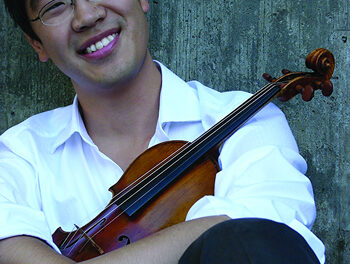The Chapel Hill Philharmonia, the outfit that used to call itself the Village Orchestra, has definitely attained its maturity under the leadership of music director and conductor Donald L. Oehler, whose quarter-century of service was formally recognized during the orchestra’s final concert of the 2017-18 season.
Concertmaster Mark Furth’s program notes – the most expansive and erudite such annotations available anywhere hereabouts – explained the concept of the program, subtitled “In the Shadow of Giants” – the giants being Bach, Haydn, Mozart, and Beethoven. Thus the lineup included significant music by Mendelssohn and Vieuxtemps and Brahms, scores that bear influential fingerprints from the past as they forged new paths into the Romantic era.
Take Mendelssohn’s “Hebrides” Overture (aka “Fingal’s Cave”), one of his most dramatic works, one that in turn surely influenced Wagner just a decade or so later, whether or not the latter would admit it. This proved to be a bold and vibrant statement reflecting nature’s power and might in sound, with considerable string radiance and solid support from the other sections. The orchestra, the ranks of which are staffed by seasoned players, responded to Oehler admirably, reminding one once again of the importance of size (in terms of the number of strings) when playing Romantic scores.
The concerto by Vieuxtemps – No. 5, in A minor, Op. 37 – has been the vehicle with which soloist Caroline Jesalva has introduced herself to a large audience this season. Her win in the Chapel Hill Phil.’s Young Artist Concerto Competition was hardly an isolated victory for her, as just two weeks ago she’d played the first movement in Raleigh, with the Triangle Youth Philharmonic; here the entire concerto was given, and it was worth the wait, for this was one of the best such occasions in recent – or even distant – memory, so poised and accomplished she is, and so admirably unified this reading was, in every respect. The artist studied with Margaret Garriss and now is under Eric Pritchard‘s tutelage; and she sings jazz in her spare time(!). The performance was totally professional, and the support she received from her orchestral partners was comparable in every respect. The first movement is the concerto’s most substantial section, but the lovely Adagio, portions of which are over pizzicato orchestra strings and the principal theme of which, by André Ernest Modeste Grétry, was a favorite of Napoleon (see, it pays to read those notes!), was impressive, and the quick finale gave the concerto a firm conclusion that we missed during the Raleigh concert.
The finale of the concert itself was Brahms’ Symphony No. 1, a towering work that bedeviled its composer in the wake of Beethoven, hence inspiring this program’s “Shadow of Giants” theme. Any orchestra that can play this work as beautifully as the CHP did merits our attention and appreciation. The tempi were completely appropriate for the score and the venue, which (it must be noted) seemed a good deal more bright and reverberant than the last time we’d visited Hill Hall‘s venerable auditorium. (Perhaps this was because the dampening curtains on the south side were not deployed?) The substantial crowd responded with comparably loud applause before joining the players for a reception in the lobby.
Our community orchestras form vital and integral parts of of our musical lives. This one merits the enthusiastic support of the region it serves – as of course do all the others, too!











